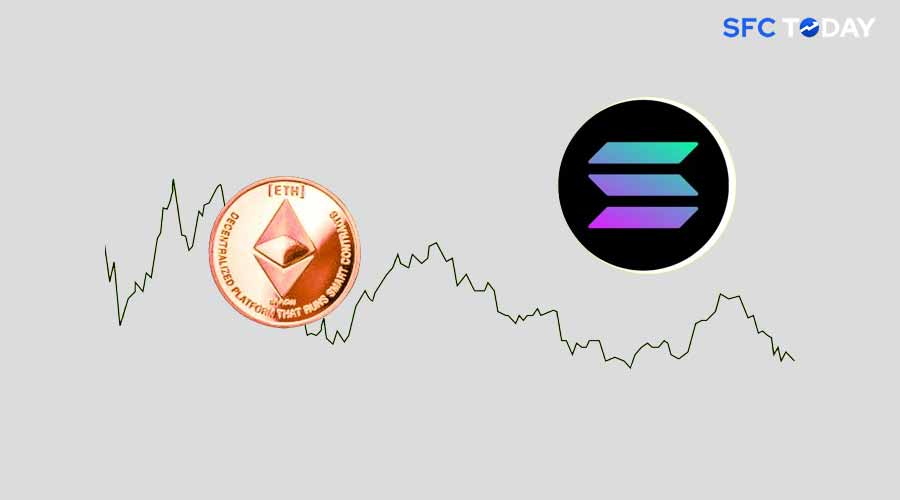One of Solana’s standout features is its impressive transaction speed
The term “Ethereum Killer” has been used to describe blockchain platforms that aim to surpass Ethereum in terms of functionality, scalability, and adoption.
Among these contenders, Solana has gained significant attention since its launch in 2020, largely due to its high transaction speeds and low fees.
Here, we will explore the pros and cons of Solana:
What is Solana?
Solana is a high-performance blockchain platform designed to support decentralized applications (dApps) and cryptocurrencies.
Solana uses a unique consensus mechanism called Proof of History (PoH) in combination with Proof of Stake (PoS) to achieve both high throughput and low latency.
This combination allows Solana to process a higher volume of transactions than Ethereum, which has drawn significant interest from developers and investors alike.
Pros of Solana
1. High Transaction Speed
One of Solana’s standout features is its impressive transaction speed. The platform can process over 65,000 transactions per second (TPS), vastly outperforming Ethereum’s current capacity of around 15 TPS.
Solana achieves this speed through its Proof of History (PoH) mechanism, which timestamps transactions to ensure they are processed in the correct order.
This feature provides a significant advantage in industries where speed is crucial, such as decentralized finance (DeFi) and non-fungible tokens (NFTs).
2. Low Transaction Fees
Another major advantage of Solana is its low transaction fees. Ethereum’s gas fees can become prohibitively expensive during periods of high network congestion, making it less accessible for everyday users.
In contrast, Solana maintains minimal transaction costs, even during peak periods. This affordability has made Solana particularly attractive to developers and users.
3. Scalability
Solana’s architecture is designed for scalability. Unlike Ethereum, which faces limitations as its network grows, Solana can handle a large number of transactions without compromising on speed or cost.
This makes it an ideal platform for developers seeking to build scalable dApps that can accommodate increasing user demand.
Solana’s scalability is also a significant draw for those looking to create complex decentralized applications with mass-market potential.
4. Growing Ecosystem
Solana has seen rapid growth in its ecosystem, with a multitude of projects and dApps being developed on the platform.
This includes DeFi applications, NFT marketplaces, and various other innovations. Solana’s expanding ecosystem is attracting a diverse range of developers, from those building financial applications to artists and content creators leveraging NFTs.
This growth is further supported by venture capital and partnerships with prominent firms in the blockchain space.
5. Strong Developer Support
Solana offers robust developer support, with extensive resources available for those looking to build on the platform.
The Solana Foundation has created comprehensive documentation, developer tools, and active community forums to ensure that developers have everything they need to succeed.
This support has contributed to the rapid growth of Solana’s ecosystem, as more developers feel confident in deploying their projects on the platform.
For developer resources, check out the Solana Developer Portal.
Cons of Solana
1. Centralization Concerns
One of the primary criticisms of Solana is its level of centralization.
A significant portion of the network’s validators are controlled by a small number of entities, raising concerns about the platform’s decentralization and security.
In a truly decentralized blockchain, no single entity or group should have too much control, as this undermines the principles of blockchain technology.
Solana’s current validator distribution has led to some skepticism about its long-term resilience against censorship or attacks.
2. Network Outages
Solana has experienced several network outages, which have raised questions about its reliability.
These outages, caused by issues such as network congestion and bugs in the system, have temporarily halted transaction processing on the platform.
While the Solana team has worked diligently to resolve these problems, the outages highlight the challenges of maintaining a high-performance blockchain without compromising stability.
You can check Solana’s current network status via the Solana Network Status page.
3. Less Established Ecosystem
Ethereum has had a significant head start, with a large number of dApps, developers, and users already deeply entrenched in its ecosystem.
This first-mover advantage gives Ethereum a critical edge in terms of network effects, which can be difficult for newer platforms to overcome. While Solana is rapidly growing, it still lags behind Ethereum in terms of overall adoption.
4. Security Concerns
As a newer platform, Solana has not been tested to the same extent as Ethereum. While it has implemented several security measures, the platform’s security is still unproven over time.
In contrast, Ethereum has faced numerous security challenges and has emerged more resilient. Solana will need to prove its ability to withstand both internal and external threats in the long term to gain the same level of trust as Ethereum.
5. Intense Competition
Solana is not alone in its quest to surpass Ethereum. Other blockchain platforms such as Cardano, Polkadot, and Binance Smart Chain are also vying for the top spot.
This intense competition means that Solana must continuously innovate and improve to stay ahead. Each of these platforms has unique strengths, and it remains unclear which, if any, will ultimately dethrone Ethereum.
Solana has made significant strides in the blockchain space, particularly with its high transaction speeds, low fees, and scalable architecture.
These features position it as a strong contender in the race to become the leading blockchain platform.
However, challenges such as centralization concerns, network reliability issues, and competition from other platforms cannot be ignored. Whether Solana will ultimately surpass Ethereum remains to be seen, but it is clear that it is a serious player in the evolving world of blockchain technology.







